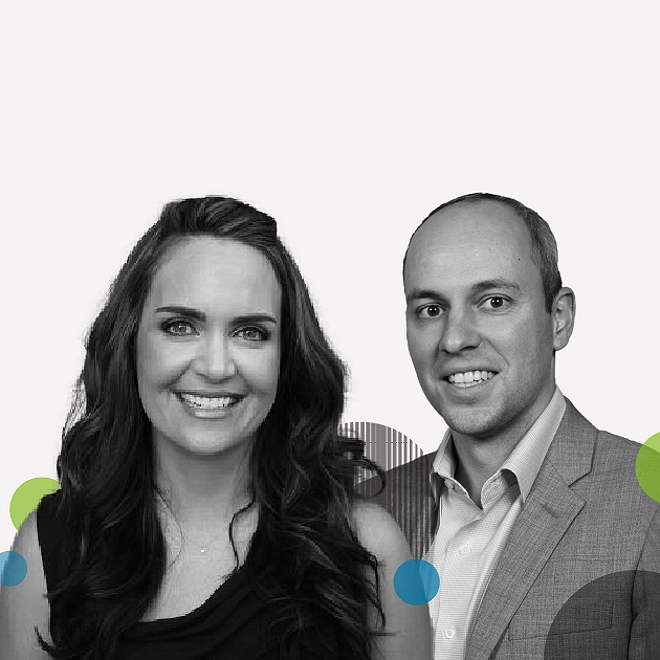The future of the Chief Sustainability Officer
Introducing the sense-maker in chief
What is the role of a chief sustainability officer in a financial services firm? Deloitte’s Dan Oakey and sustainability expert Emre Tiftik says it’s to build an environmentally conscious firm through strategy and influence.
The future of the chief sustainability officer
Dan Oakey: We live on a fairly small sphere and it’s a closed system. Everything the companies do, everything they emit, or every side effect that their activities have, come back to affect somebody somewhere in the system.
Tanya Ott: Financial services firms are getting serious about sustainability. What’s driving that trend, today on the Press Room.
Tanya Ott: I’m Tanya Ott. The world really is a small space and the choices companies make, from the way they produce and distribute products to the investments they make, can have outsized effects on the environment. Historically, when organizations looked to invest their assets, the potential financial return was one of the biggest determinants.
But increasingly, investors are focusing on being environmentally and socially responsible. And more financial services firms are responding by appointing chief sustainability officers.
What is this relatively new addition to the C-suite? I invited Dan Oakey and Emre Tiftik onto the show [to] talk about it. Dan an associate director for Risk Advisory at Deloitte UK.
Dan Oakey: I’ve been involved in financial services for about 15 years now, but with a background in financial journalism.
Tanya: Emre Tiftik is the director of sustainability research at the Institute of International Finance.
Emre: I am a trained economist. I’ve been working on capital markets for almost 10 years, but over the last couple of years, my priority has been sustainability issues, especially from an analytical perspective.
Tanya: The Institute for International Finance and Deloitte have collaborated on new research looking at environmental, social, and corporate governance—you’ll hear them refer to that as ESG. They surveyed leaders in nearly a hundred companies and organizations across the world and in different market sizes. They also did some fieldwork and follow-up interviews. All with the goal of better understanding how companies are thinking about sustainability.
I started by asking them what’s driving this trend for financial services to appoint CSO’s or chief sustainability officers.
Dan: These large companies, often they wait to see which way they have to act before they embark on very time-consuming and costly changes of policy or direction. So there’s been a certain amount of waiting to see whether everybody is really going to move in this direction before anyone does. They tend to move in packs, and that’s certainly true of finance.
Tanya: What’s the problem with that waiting to see attitude?
Dan: Somebody has to be first or somebody has to coordinate action. That’s what we’re seeing now. Whether you’re regulators and rule setters, whether you’re investors and institutional owners, whether you’re employees of firms or consumers, or even the supply chain of these large companies, everybody’s seeing at the moment that they have the same imperative. At a certain point, there’s a tipping point where everyone realizes that everybody else is thinking the same thing, too. And that thing at the moment is that we need to be sustainable in our economic and financial operations. We only have one earth.
I’m seeing this from all different directions: You speak to an accountant and they’ll talk to you about new accounting models to account for more than just financial capital. There are models emerging for financial capital and social capital and natural capital within the same reporting and performance management within the bank or an insurance company. Within the risk management area, you’re seeing lots and lots of regulations come in that say, you will only be able to invest in this market if you follow these rules. There’s a big compliance drive and risk-management drive. But we’re also seeing huge amounts of focus from institutional investors and the owners of companies saying, “We have the power to vote against you, dear boards and dear directors, unless you are doing something which we think is working well for the long-term benefit of the company.” So there’s now a coalescence of forces that people are seeing that really means everybody gets it now.
Tanya: I love this phrase that you have, you call a sense-maker in chief, the chief sustainability officer. Tell me a little bit about the CSO. What is that role exactly?
Dan: The way that we see it, which our survey has brought out, is that there is really a lot of work to do to reestablish and reconfigure companies’ business models so that they are sustainable, so that they factor in all of the regulation, all of the risks, all of the opportunities. The amount of change that’s going on at the moment is simply too great for companies to handle. If you think about it, at the same time that you’re completely reconfiguring the ship, you’re also at sea trying to sail. Current executives in banks and insurers and investment managers, they’re already very busy. They’ve got enough on their plate just trying to compete and stay afloat from one year to the next. There’s a whole new set of demands on these companies, and they’re not specialists in these new demands. They’re not specialists in sustainability. They need somebody who’s dedicated to that particular skill set and that particular knowledge set who can help them make sense of all the changes that are going on and to work out what to do next, in what order and with what speed and who to listen to and who to put to one side for the moment.
Emre: Sustainable finance is not a new thing for the financial services industry. It has been always a key issue, but maybe in a different dimension. We know that philanthropic donations have been a big part of the business model, mainly driven by the communication teams. But again, as Dan mentioned, the reality is changing. Momentum is growing fast. This is driven by regulation [or] sometimes driven by investor demand. So there is a significant demand for a centralized position. Sometimes we see it in the form of a chief sustainability officer, but sometimes it is the head of sustainability or head of ESG. Depending on the culture and the needs of the specific institution, this position takes a different shape.
Again, it’s all about the culture. It’s all about the geographical location. Because of that, the priorities of the position change significantly. So if you go to Europe, there is no single board discussion without mentioning climate change. But if you go to the emerging markets, let’s say Egypt, Turkey, there are much different issues like financial inclusion. Or if you go to Asia or Latin America, deforestation, palm oil suddenly become a big issue. For example, in Japan, the biggest thing is the coal power. Japan is the only G20 country which still continues to increase its coal power generation capacity,1 which is a big challenge for the financial industry since it creates reputational issues as long as they continue to finance these type of activities.
Tanya: Emre, you explain really well the difference between how different firms’ cultures might influence this and then also different regions in the world. But when we place this CSO position within the context of financial services, specifically, what does that mean?
Dan: There’s a few things that make FS firms different. Firstly, they tend to be leveraged, so their impacts on the broad economy is really large when you have the leverage of the loans involved. Secondly, is the maturity of loans or of insurance contracts. If you take a municipal bond, it’s in the market for 30 years. Well, 30 years’ time takes us to 2051, by which time we’re supposed to have sorted out sustainability and climate change. So the products have in them, baked in, a timeline that takes us to the resolution [of] our climate quandary. That’s a big impact, a big difference between FS firms and perhaps consumer goods firms. The third thing is that whether you’re lending to the wider economy or you’re holding shares in the wider economy as asset managers do, you’re insuring or financing or owning vast swathes of the economy, of all kinds of different sectors. So you really are integrated across the world and into the future.
Tanya: So what does the CSO actually do? Is there like a typical job description for a CSO in financial services?
Emre: It is difficult to claim that, so, again depending to the culture, the definition changes significantly. But in the report we try to highlight a couple of key common points. First of all, they are the translators. The external world is changing so fast, so rapidly. The sustainable finance agenda is changing so quickly, so there’s a need for a person who can translate what’s going on outside to the inside organization. Nobody has all the time to follow all these rapidly changing trends in sustainable finance. So first they are the translators.
Second, the pressure from the stakeholders are impressive. This requires [a] kind of a strategy change. The current business models in many financial institutions may not be suitable to address this ever-increasing pressure from different stakeholders so they reshape, reorganize, change the strategy of the institutions.
The third one; this is teamwork. They cannot do it by themselves. It is important to put all the different players within the institutions together by educating them, by connecting the dots. So they are also doing a lot of education to increase the awareness about sustainability within their organizations.
Tanya: Who makes a good CSO?
Dan: We looked at this and we asked by the skill sets needed in the kind of people that are actually in the role and how long they’ve been in the role. One of the key findings was that over 80% of people in CSO-type roles were personally approached and came from within the firm they’re working in. What that says to us is that the inside knowledge and inside contacts are really heavily valued in this role. You have to know the company. You have to know the products. You have to know how it works. You have to know how the products are risk managed. And to influence, you have to know the people. You have to be very, very good at networking because you’re going to have to influence such a wide range of stakeholders inside and outside the firm.
The second thing that came out for me, and Emre can help me, was the range of communication styles that you need to be excellent at in order to succeed in this job. You have to have the high-level strategy up your sleeve so you can talk strategy with the business heads and the divisional heads. But you’ve also got to be able to influence and persuade, to explain, to empathize, to translate, to put yourself a level of the person you’re speaking with, speak their language, whether it’s talking to an NGO about palm oil, talking to divisional head about reallocating jobs within that team because they’ve got to move away from brown industries, and then talking to the CEO about the kinds of threats that might come the next time they are in public and being asked to defend their company’s actions. So a huge range of scenarios that have to be flexible enough to work within.
Tanya: Is it difficult to find someone for that role? I mean, is that kind of a unicorn or is there a pipeline?
Emre: They are not superwoman or superman. There is no perfect resume for this position, so therefore it is sometimes difficult to find.
Tanya: What do financial service firms risk if they don’t have someone in the C-suite that is responsible for the sustainability issue?
Dan: A couple of things spring to mind there. Firstly, it’s hard to get traction within these large companies. The average financial services company, the large ones may have over 100,000 people working in many, many countries. In order to influence, you need to have clout and you can have personal clout and you can have the strength of your convictions, but having somebody at that C-suite level, with the specific backing and authority of a chief executive, and by implication the board, really helps to give that person weight when they speak and backing when they need to advance sometimes unpopular short-term costs.
Emre: The dynamic is also changing quickly, so if they don’t catch up with the reality of what’s going on in the external world, they will miss the new business opportunities. So, for example, right now we are talking about this development in sustainable debt markets. Everybody is trying to issue green bonds, sustainable bonds as ESGs become much, much more important. But if you go to the emerging markets, the process is not very well developed. There are concerns that if they are going to be behind in the sustainable finance sector, maybe they will not be able to attract international capital flows anymore. So there’s a need for someone who is going to flag this, saying that we need to change our products. We need to make sure that we reshape ourselves based on the changing world. So this is the CSO’s job.
Dan: Yes and just to back up that point, we hear quite a lot to talk about how sustainability will lead to a fundamental reallocation of capital. It’s the board’s job of a company to make sure that that allocation of capital is done in a way that makes strategic sense. But that reallocation can happen incredibly quickly. And the companies that don’t have a CSO and that don’t take this seriously risk having an out-of-date business model, that they’re left holding assets or holding positions at a time when nobody else wants to hold those positions and nobody else thinks that’s a viable business model.
Tanya: What do you expect this role to look like in the future?
Dan: That’s a really good question, and our survey finds that people don’t know. There’s a wide range of opinions there. Some people think that there’ll be a CSO in the same way that there will be a CRO—the chief risk officer—because there will always be a new sustainability issue, whether that’s biodiversity, whether that is palm oil or deforestation, or ocean management. There’s going to be a new thing that comes up as we work through. Some people think it will eventually become similar to the CEO, because if you’re not sustainable, then you’re not in the game forever, for long enough. Some people think it’s going to go to the CFO because ultimately performance will be managed on a common capitals basis from financial to natural to social capital. And then some people think that it’s going to be absorbed into everybody’s way of working, in the same way that there used to be a chief digital officer, and that’s just faded away because everybody gets digital now, digital is the way of working, so it just becomes a small part of everyone’s job. So those are four alternatives. And I can believe that all four would be right at any one time for any one company, so I don’t know.
Emre: Increasingly, every country wants to reduce their carbon emissions to net zero by 2050. So we have 30 years. This means that there will be a lot of demand for CSOs in the next 30 years, just for the climate agenda. But again, there are a bunch of other teams, ESG teams which are gaining momentum, like biodiversity, deforestation. So there will be always a need for a CSO, but again, depending on the business model, the culture of the institutions, the title might be different. We might call them as a head of sustainability. Maybe there will be limited executive powers, but they will continue to be a central position, most probably, and increasingly more important.
Tanya: And what was the most surprising thing that came out of either the survey or those more intensive onsite meetings?
Emre: The most exciting thing was people are much, much more worried about broader ESG issues. They say they don’t specifically focus on climate. They know that this is going to be a big journey and this is going to change how they do business.
The second most interesting thing was, for me, the increasing importance of these issues outside of the euro area. Whenever we talk about the ESG, the conversations are all about Europe, but actually in North America, this agenda is driven by investor [and] asset owners’ demand. There is a bottom-up demand. Same thing is true for Asian emerging markets—the public awareness is pushing financial institutions to change.
Dan: I also thought that most would be focused on environmental sustainability and that really wasn’t the case. We asked people, do you focus on every aspect of ESG, mostly on environmental sustainability, or totally on environmental sustainability. And nobody said totally and very few people said mostly. So the most common answer was across all aspects of ESG.
But two things that surprised me about the survey were firstly that the skill sets that people value were not the ones I was expecting. I thought there might be some aspects of data management, data quality or data understanding, or risk management or compliance with regulations, [but] that really wasn’t prioritized. Across the board, really no matter what we looked at, the skills that were really valued were strategy and influencing, which says to me that this is the role that really sits at the top of the house where you can set strategy and then make sure that strategies follow through across the organization.
One of the questions we asked people was, “Which do you think should a CSO prioritize? Should they try to reduce that firm’s carbon footprint? Should they make sure that firm is compliant with all of the regulations that are coming out? Or should they reconfigure that firm’s business strategy?” And by a substantial margin, almost everybody chose, “We’re here to help reconfigure the business strategy.” CSO’s are pivotal in shifting how firms respond to the external environment and how they make money in the long term.
Emre: Collaboration and competition, this is going to be very crucial for the business for CSOs. They have to collaborate with their peers in order to elevate this agenda within the financial institutions. But on the other hand, they also need to make sure that they create revenue for the institutions that they work for.
Dan: One of the things that CSOs help a firm to do is to work out how to remain profitable in a world in which they can no longer externalize as much as they used to. So, in the earlier forms of corporate life, companies were able to focus on their inputs, produce profits, and their outputs with their products. The externalities that they have, the effects they have on the wider system, weren’t perhaps always taken into account. But we live on a fairly small sphere and it’s a closed system. Everything that companies do, everything they emit, or every side effect that their activities have comes back to affect somebody somewhere in the system. Accounting for those externalities is a major challenge and one that CSOs can help their firms to overcome.
Tanya: Dan Oakey is an associate director for Risk Advisory at Deloitte UK, and Emre Tiftik is the director of sustainability research at the Institute of International Finance. Their new report The future of the Chief Sustainability Officer: Sense-maker in chief goes into much greater details about some of the issues we touched on today. You can find a link at deloitte.com.
You can find us on Twitter at @DeloitteInsight and I’m on Twitter at @tanyaott1.
Make your life easier. Subscribe to the Press Room podcast so the latest episode will drop on your phone, tablet or other device as soon as it’s released. Or better yet, download the DeloitteInsights app, where you can personalize the content to the industries and topics that most interest you, get the days essential world, business and finance news in five minutes, watch the markets and listen to our podcasts.
Thanks for joining us today. We’ll be back again in two weeks. I’m Tanya Ott. Be well and stay safe.
This podcast is produced by Deloitte. The views and opinions expressed by podcast speakers and guests are solely their own and do not reflect the opinions of Deloitte. This podcast provides general information only and is not intended to constitute advice or services of any kind. For additional information about Deloitte, go to Deloitte.com/about.
Strategic & Reputation Risk
Deloitte helps organizations make risk-informed strategic choices and respond to disruptions to grow their business and protect their reputation. C-suite and boards need the right insights, best-in-class corporate governance, and a risk culture aimed at driving value.




